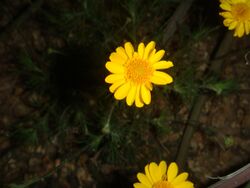Biology:Thymophylla tenuiloba
From HandWiki
| Thymophylla tenuiloba | |
|---|---|

| |
| Scientific classification | |
| Kingdom: | Plantae |
| Clade: | Tracheophytes |
| Clade: | Angiosperms |
| Clade: | Eudicots |
| Clade: | Asterids |
| Order: | Asterales |
| Family: | Asteraceae |
| Genus: | Thymophylla |
| Species: | T. tenuiloba
|
| Binomial name | |
| Thymophylla tenuiloba (DC.) Small
| |
| Synonyms | |
|
Dyssodia tenuiloba (DC.) B.L.Rob. | |
Thymophylla tenuiloba, also known as the bristleleaf pricklyleaf,[2] Dahlberg daisy, small bristleleaf pricklyleaf, golden fleece, or shooting star, is a bushy, multi-branched flowering annual from the family Asteraceae. Native to south central Texas and northern Mexico, it produces a large number of small, yellow flowers and demonstrates a trailing habit. It is tolerant of heat and dry conditions and is sometimes sold as a summertime annual plant in areas beyond its native range.
The plant was once known as Hymenatherum tenuilobum in the De Candolle system.
The species is naturalized in Queensland in Australia.[3]
References
- ↑ {{citation | mode = cs1 | title = Thymophylla tenuiloba (DC.) Small | work = Germplasm Resources Information Network (GRIN) | url = https://npgsweb.ars-grin.gov/gringlobal/taxonomydetail.aspx?459920 | publisher = [[Organization:Agricultural Research ServAgricultural Research Service (ARS), United States Department of Agriculture (USDA) | access-date = 16 January 2018 }}
- ↑ "Thymophylla tenuiloba". Natural Resources Conservation Service PLANTS Database. USDA. https://plants.usda.gov/core/profile?symbol=THTE7. Retrieved 10 December 2015.
- ↑ "Thymophylla tenuiloba". Australian Plant Name Index (APNI), IBIS database. Centre for Plant Biodiversity Research, Australian Government, Canberra. http://www.anbg.gov.au/cgi-bin/apni?TAXON_NAME=Thymophylla+tenuiloba. Retrieved 30 July 2011.
- FLORIDATA page on Thymophylla tenuiloba
- Flora of North America page
- Atlas of Florida Vascular Plants page
External links
Wikidata ☰ Q7799641 entry
 |

